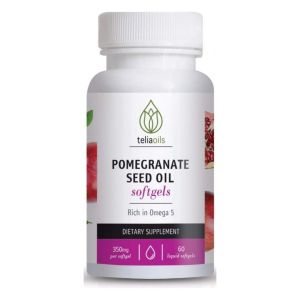Is Pomegranate Good for Your Brain? Exploring the Cognitive Benefits of This Vibrant Fruit

Pomegranates have long been revered for their rich taste and vibrant color, but did you know that they also offer many health benefits? Among the numerous advantages of consuming pomegranate is its potential to support brain health. In this article, we will delve into the cognitive benefits of pomegranates and how incorporating them into your diet can support a healthy, sharp mind.
Pomegranate's Rich Antioxidant Profile
Pomegranates are packed with powerful antioxidants, particularly polyphenols, which help protect the body against oxidative stress caused by free radicals. Oxidative stress can damage brain cells and contribute to cognitive decline, making antioxidants essential for maintaining brain health. By adding pomegranate into your diet, you can boost your antioxidant intake and support optimal brain function.
Anti-inflammatory Effects for Brain Health
Chronic inflammations have been linked to various neurological disorders, including Alzheimer's disease and Parkinson's disease. Pomegranate contains potent anti-inflammatory compounds, such as punicalagin and ellagic acid, which can help reduce inflammation throughout the body, including the brain. Consuming pomegranate regularly may help in preventing neurodegenerative diseases and maintaining overall brain health.
Promoting Healthy Blood Flow
Proper blood flow is crucial for delivering oxygen and essential nutrients to the brain. Pomegranate is known to improve blood flow, thanks to its high concentration of nitrates and nitrites. These compounds help dilate blood vessels, increasing blood circulation to the brain and supporting cognitive function. By adding pomegranate into your diet, you can potentially enhance brain function and improve memory and focus.
Supporting Brain Cell Growth and Repair
Pomegranate contains several bioactive compounds that may promote neurogenesis – the process of creating new brain cells. These compounds include urolithin A, a metabolite produced when the body breaks down pomegranate's ellagitannins. Studies have shown that urolithin A may support brain cell growth and repair, which can help maintain cognitive function and protect against age-related cognitive decline.
How to Incorporate Pomegranate into Your Diet
There are many ways to include pomegranate in your diet to reap its brain-boosting benefits. You can consume pomegranate seeds directly, add them to salads, yogurt, or oatmeal, or blend them into smoothies. Pomegranate juice is another popular option, but be mindful of added sugars and opt for 100% pure pomegranate juice when possible. As with any fruit, moderation is essential – stick to one serving of pomegranate or juice per day to avoid excessive sugar intake.
Pomegranate's powerful antioxidant, anti-inflammatory, and circulatory benefits make it a valuable addition to a brain-healthy diet. By incorporating this vibrant fruit into your daily meals, you can support cognitive function, promote brain health, and potentially protect against age-related neurological disorders. Remember, a balanced diet rich in a variety of fruits, vegetables, whole grains, and lean proteins is the key to maintaining both brain and overall health.

 de
de el
el











